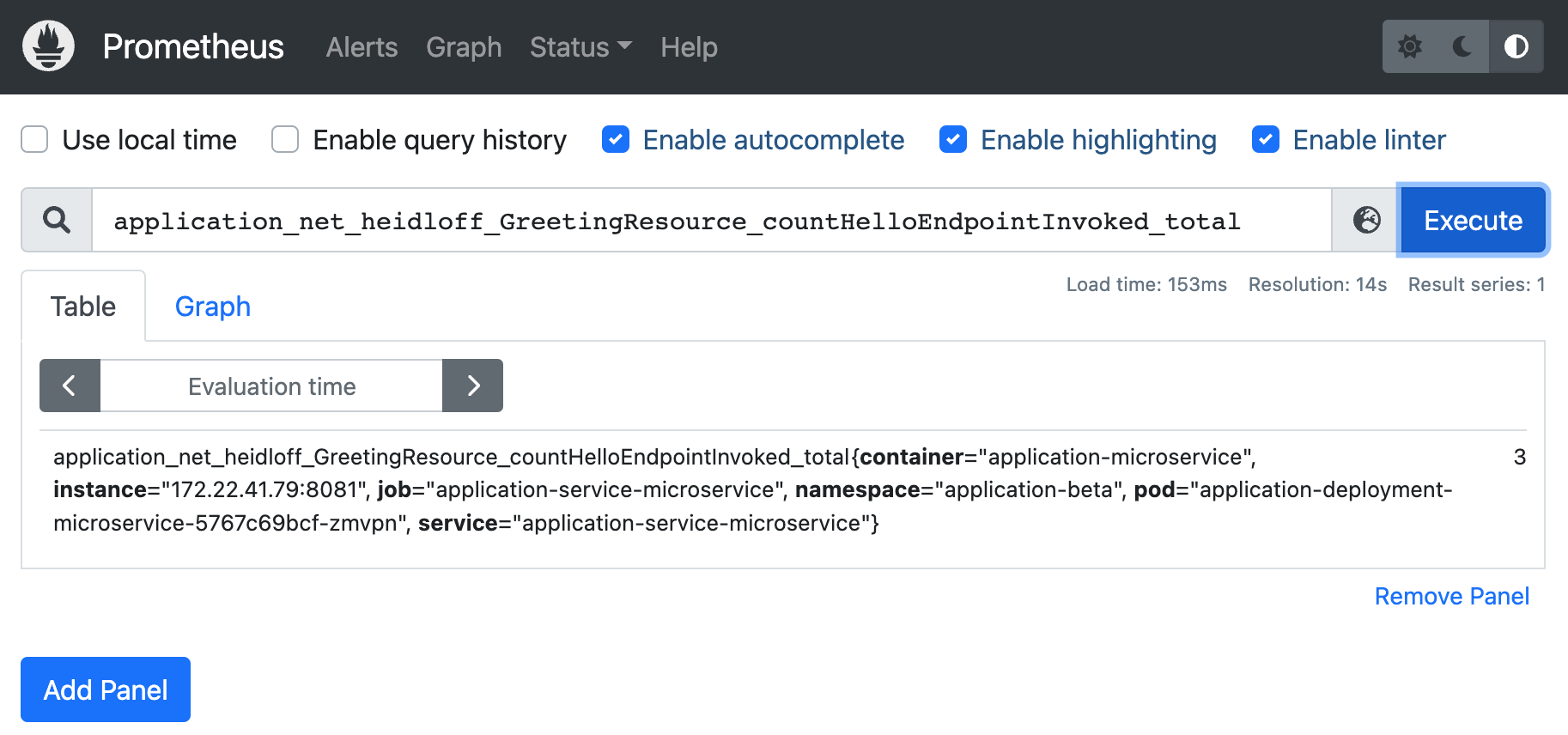Scaling Applications automatically with Operators¶
The application operator can perform automatic scaling of the front-end simple-microservice application. The simple-microservice application publishes metrics which are collected by Prometheus monitoring. Prometheus stores metrics from various sources and provides query capabilities. It is on the basis of this Prometheus data that auto-scaling decisions are made.
The simple-microservice application has been implemented with Quarkus. It uses Eclipse MicroProfile to track the number of invocations of its /hello endpoint (see code).
import org.eclipse.microprofile.config.inject.ConfigProperty;
import org.eclipse.microprofile.metrics.annotation.Counted;
@Path("/hello")
public class GreetingResource {
@ConfigProperty(name = "greeting.message")
String message;
@GET
@Produces(MediaType.TEXT_PLAIN)
@Counted(name = "countHelloEndpointInvoked", description = "How often /hello has been invoked")
public String hello() {
return String.format("Hello %s", message);
}
}
To allow Prometheus to scrape these metrics, a ServiceMonitor resource is used. This resource is created by the application operator (see code)
apiVersion: monitoring.coreos.com/v1
kind: ServiceMonitor
metadata:
labels:
app: myapplication
name: myapplication-metrics-monitor
namespace: application-beta
spec:
endpoints:
- path: /q/metrics
selector:
matchLabels:
app: myapplication
The Prometheus user interface can also be used to manually query this data.

To implement the scaling decision logic, a separate image/container is used. This container can be considered an extension to the application operator. The application operator sets up a CronJob for the operator-application-scaler so that it is run on a scheduled basis. The CronJob that is created by the controller looks like this. Note that the application name and namespace are passed in as parameter.
apiVersion: batch/v1
kind: CronJob
metadata:
name: application-scaler
namespace: operator-application-system
spec:
schedule: "0 * * * *"
jobTemplate:
spec:
template:
spec:
containers:
- name: application-scale
image: docker.io/nheidloff/operator-application-scaler:v1.0.117
imagePullPolicy: IfNotPresent
env:
- name: APPLICATION_RESOURCE_NAME
value: "application"
- name: APPLICATION_RESOURCE_NAMESPACE
value: "application-beta"
restartPolicy: OnFailure
The implementation of the actual operator-application-scaler application is trivial. It uses the Prometheus Go client library. Note that this library is still considered experimental. Alternatively consider the Prometheus HTTP API.
prometheusAddress := "http://prometheus-operated.monitoring:9090"
queryAmountHelloEndpointInvocations := "application_net_heidloff_GreetingResource_countHelloEndpointInvoked_total"
client, err := api.NewClient(api.Config{
Address: prometheusAddress,
})
if err != nil {
os.Exit(1)
}
v1api := v1.NewAPI(client)
ctx, cancel := context.WithTimeout(context.Background(), 10*time.Second)
defer cancel()
result, warnings, err := v1api.Query(ctx, queryAmountHelloEndpointInvocations, time.Now())
if err != nil {
os.Exit(1)
}
resultVector, conversionSuccessful := (result).(model.Vector)
if conversionSuccessful == true {
if resultVector.Len() > 0 {
firstElement := resultVector[0]
if firstElement.Value > 5 {
// Note: '5' is only used for demo purposes
scaleUp()
}
}
}